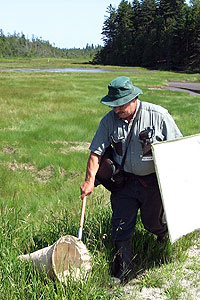|
|
|
|
Acadia National Park
SERC - Research Opportunities
|
|
|
|
|
|
 |
|
 |
| NPS/John Kelly | |
 |
One of the most important roles of the Schoodic Education and Research Center is to expand the scope and effectiveness of research within Acadia National Park and the National Park Service system. Acadia has an extensive history of natural and cultural resource research and currently supports an active and multidisciplinary program.
The National Park Service offers a variety of research support opportunities, including grant funding; reduced-cost housing and work space on an availability basis; and access to an extensive natural resource library, along with an on-line annotated natural resource bibliography, covering over 80 years of research efforts in Acadia National Park. For more information about research in the park, including an exciting new research fellowship program, visit the links below.
Research Activity | Info for Researchers | Acadia Research Fellowships | BioBlitz | Research Catalog
|
Information for Researchers
Research Guidelines are available for potential investigators who wish to conduct research at Acadia National Park.
|
|
Acadia National Park Research Activity
View current research activity in the park.
Information about Past Science Activities at Acadia National Park: Search an online annotated bibliography of park-related natural resource, social science, and cultural history journal articles, reports, and other materials. The Gulf of Maine KnowledgeBase provides easy access to information about the Gulf of Maine and its watershed in Massachusetts, New Hampshire, Maine, New Brunswick, and Nova Scotia, including Acadia National Park. The KnowledgeBase is a directory of technical reports, journal articles, fact sheets, maps, websites, and other information sources for science, policy, education, and management.
|
Acadia Research Fellowship Grants
To facilitate and encourage scientific research in Acadia National Park, two research fellowship programs are offered:
The L.L.Bean Acadia Research Fellowship: L.L.Bean, Inc., has generously donated $25,000 to support field research at any location within Acadia National Park in the physical, biological, ecological, social, and cultural sciences. Grants of up to $5,000 each will be awarded to proposals that address the park’s significant natural and/or cultural resources, the experiences of visitors and local residents who use the park, and the peoples who have lived in the Acadia region.
The Schoodic Research Fellowship: Acadia Partners for Science and Learning has generously donated $10,000 to support field research at the Schoodic section of Acadia National Park in the physical, biological, ecological, social, and cultural sciences. The intent of this fellowship is to expand the number of funded research projects being conducted on the Schoodic Peninsula and to bring more scientists to the Schoodic Education and Research Center campus. Grants of up to $5,000 each will be awarded.
In 2008 a total of seven research fellowships totaling $35,000 were awarded that will address important science issues at Acadia National Park. Read more about the grant recipients this year and in past years.
The 2009 research fellowship program will be announced in mid-December 2008 with applications due February 15, 2009. Information about the 2008 program can be downloaded below; appropriate forms for the 2009 program will be posted in mid-December. Please contact David Manski via e-mail or at 207-288-8720 for additional information or to be added to an electronic notification list for next year's call.
|
|
BioBlitz
Acadia National Park has hosted a series of BioBlitzes to help document some of the lesser-known taxonomic groups within the park. These BioBlitzes focus on counting as many species from one taxonomic group as possible in a 24-hour time period. While BioBlitzes cannot provide a complete inventory, they can document species occurrence, provide estimates of species richness, and identify rare and unique species.
To date, BioBlitzes in the park have focused on spiders, flies, beetles, moths and butterflies, and ants. Visit the pages below for results and images (where available).
True Bug (Hemiptera) Blitz - 2008
Spider Blitz - 2007
Fly (Diptera) Blitz - 2006
Beetle (Coleoptera) Blitz - 2005
Moth and Butterfly (Lepidoptera) Blitz - 2004
Ant (Formicida) Blitz - 2003
|
|
Acadia National Park Research Opportunities Catalog
Acadia National Park has been the focus of many different research projects that have taught us a great deal about the park's natural and cultural resources. But what information is missing? What other questions should we be asking? Park staff is undertaking an effort beginning in spring 2006 to establish a Research Opportunities Catalog that will identify gaps in data to help guide future research efforts and highlight the unique research opportunities Acadia National Park has to offer investigators.
As a kickoff to the Research Opportunities Catalog project, SERC organized and hosted a series of five day-long scoping workshops in March, which brought together more than 50 invited subject matter experts from academia, conservation groups, NPS, and other state and federal agencies. These experts were asked to address a number of questions about current research efforts and needs in Acadia and the region, emerging issues Acadia should be preparing for, and research opportunities Acadia offers the scientific community.
For further information about the Research Opportunities Catalog or the workshops, including detailed workshop notes, visit the Acadia Partners website.
|
|

|
 |
|
|






